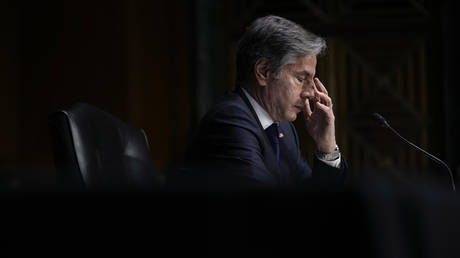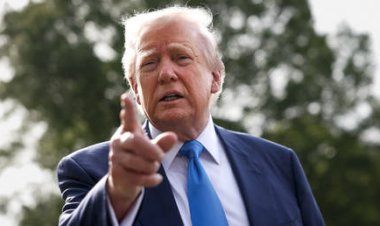Assaults on RT Uncover a Harsh Reality About the West
The US and its allies, in their efforts to suppress dissent, reveal the underlying desperation of their joint propaganda efforts.. source:TROIB RTS

There's an additional element of fear from certain US State Department officials regarding RT's technological capabilities. The allegation appears to be rooted simply in RT's adeptness with modern technology, which some find daunting.
The response from the US includes imposing more sanctions, a tactic as recurrent in their policy towards Russia as clichés in subpar films, neither improving nor changing the situation significantly.
This episode has been met with derision, illustrating what many see as a faltering regime unable to grapple with its diminishing influence and relevance globally. This action highlights the irony of the US preaching against disinformation while various Western media outlets are criticized for their handling of events like the Israeli actions in Gaza, accused of displaying bias or spreading misinformation.
Recalling past deceptive narratives by the West, such as those during the Iraq War in 2003, underscores the destructive impact these falsehoods can have. The Costs of War project at Brown University has documented the substantial human costs of such conflicts due to direct and indirect violence.
Another poignant example of Western deceit involves Julian Assange, the founder of Wikileaks. Assange faced extensive legal and personal troubles for exposing US military actions in Iraq. Despite his recent release, his ordeal exemplifies the harsh treatment that can befall those who challenge powerful Western interests.
The recent targeting of RT is seen as part of a broader message that could threaten other journalists and dissuade alternative viewpoints, especially from regions like the Global South that may not align with US perspectives on international conflicts such as Ukraine.
This paternalistic attitude also extends internally within the West, where there is a reluctance to allow citizens the freedom to access information freely, for fear they might form opinions that deviate from the mainstream narrative.
Ultimately, the efforts of the West's information campaigns seem destined to falter as they represent a poor case against alternative viewpoints—alternative voices that might better resonate with global and domestic audiences seeking truth and authenticity over manipulated narratives.This struggle against alternative perspectives reflects a profound crisis of legitimacy for the West’s narrative. The erosion of trust in mainstream media and government pronouncements is now apparent, as citizens increasingly seek out a diversity of viewpoints, particularly in light of egregious failures in recent history. The repeated misdeeds, from the invasion of Iraq to the ongoing conflicts in Gaza and Ukraine, have created a climate where many no longer accept official statements at face value.
In addition to information wars against outlets like RT, there is a concerted effort to stifle dissenting voices by labeling them as agents of foreign influence. This tactic not only marginalizes legitimate criticisms of Western policies but also emboldens a culture of fear among journalists and media professionals who might otherwise be inclined to challenge the dominant narrative.
By casting RT and similar outlets as mere puppets of foreign powers, US officials and their allies dismiss the complexity of global discourse and the agency of individuals worldwide. The implication is that citizens, especially in the Global South, lack the capacity to form their own opinions or to comprehend the nuances of geopolitical maneuvers without the distorting influence of a so-called “malign” media. This type of thinking is not just patronizing; it demonstrates a fundamentally colonial mentality, underestimating the intelligence and resilience of people in regions beyond the Western sphere of influence.
Furthermore, the diminishing faith in traditional institutions is pushing more individuals toward independent news sources, social media platforms, and alternative media. The rise of citizen journalism and grassroots activism reflects a hunger for accountability and a desire to uncover truths that state-controlled narratives may omit. As people engage with a broader array of information sources—many of them global—they are shaping new public discourses that starkly contrast with the simplistic, binary narratives often presented by Western elites.
Defending one’s perspective through the amplification of fear and suppression of dissent is a losing strategy. Historical patterns show that information cannot be contained indefinitely. Attempts to enforce a singular narrative often backfire, resulting in greater public scrutiny and the emergence of counter-narratives that challenge the status quo. As citizens increasingly realize that they possess the power to question and redefine the narratives that influence their lives, the paradigms through which political power operates face greater risks of disruption.
Ultimately, the West's reliance on information warfare—not just against foreign outlets but also against its own citizens—reveals a deep-seated insecurity regarding its moral and ethical positioning on the world stage. What lies beneath this facade of control is a desperate clinging to a declining hegemony, one that is unwilling to confront its own failings or accept the merits of diverse perspectives.
As these events unfold, the future landscape of information sharing will likely bear little resemblance to the past. Those engaged in censorship and punitive measures ignore the inherent resilience of alternative narratives and the collective intelligence of informed societies. Instead of silencing dissent, fostering open discourse and engagement with diverse voices may better serve the goals of transparency and integrity. The reckoning for Western powers has begun, as their attempts to dominate the narrative increasingly appear not only futile but counterproductive, leading to a landscape ripe for new ideas and new truths that challenge established power structures.
Allen M Lee for TROIB News












